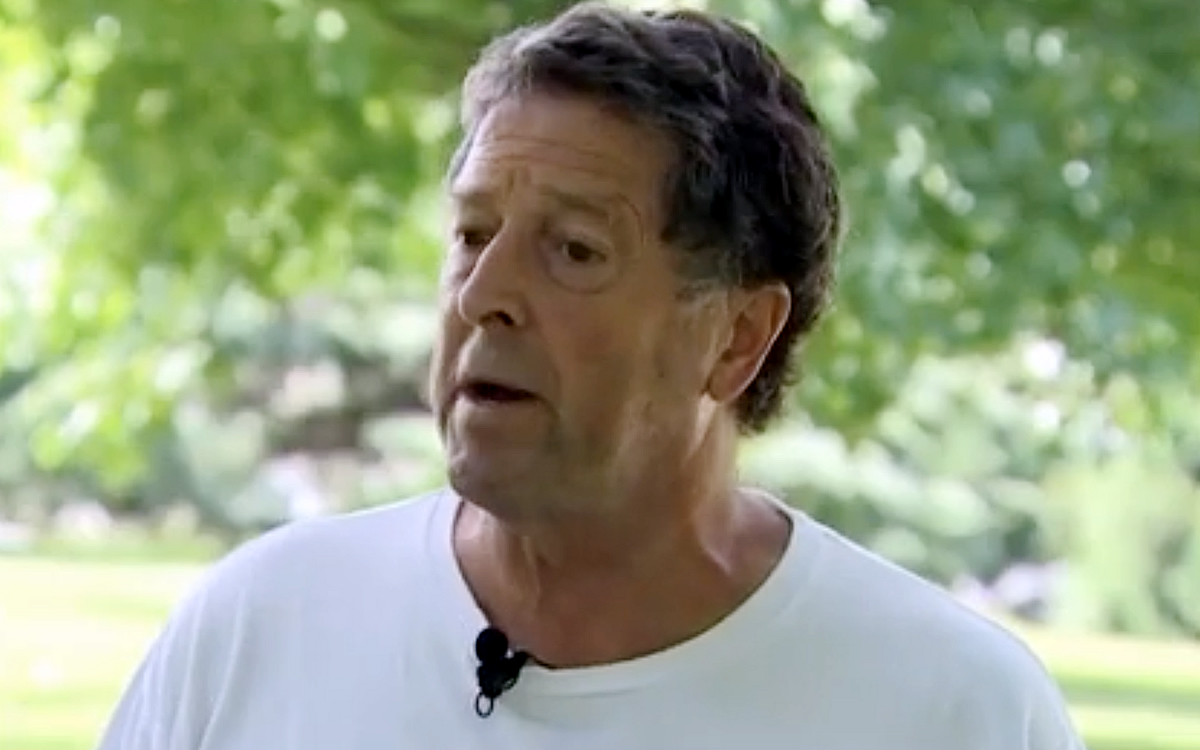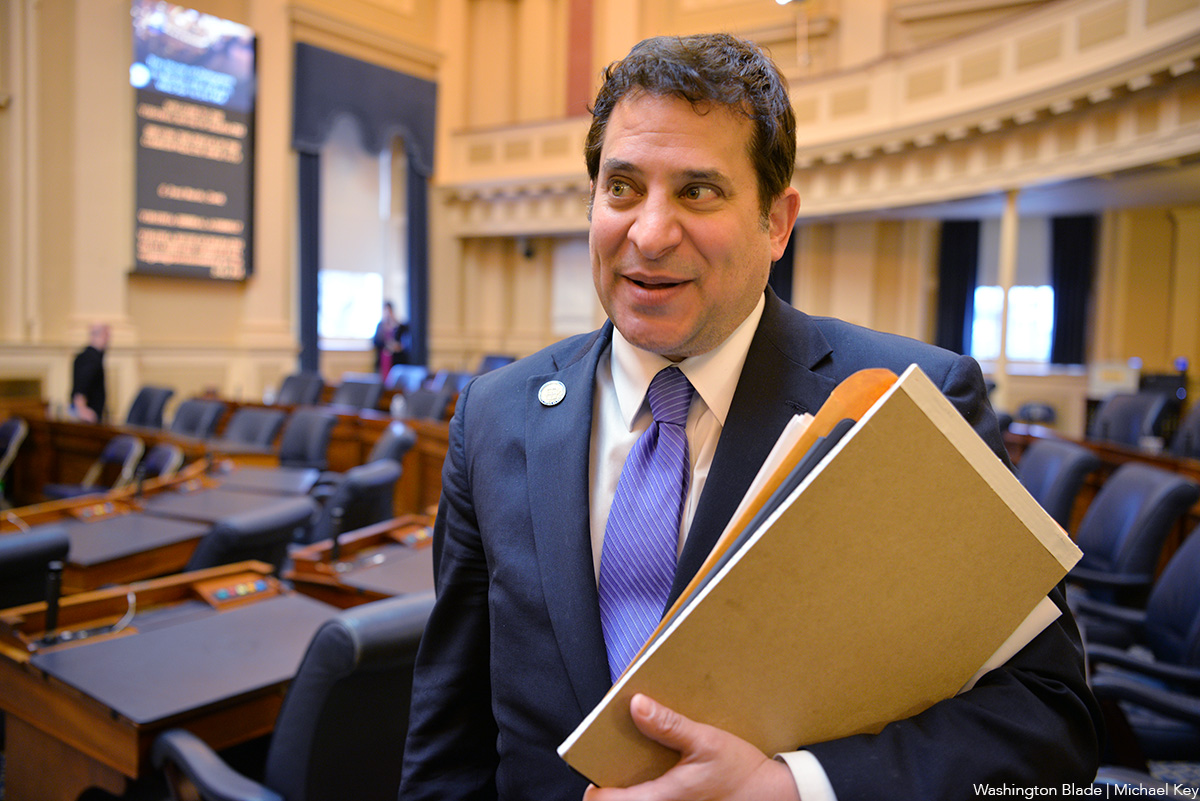Virginia
Va. lawmaker accused of destroying neighbors’ property
State Del. Dave LaRock said Pride flags were meant to provoke him

A Northern Virginia lawmaker is facing accusations of property destruction after removing signs and security camera posts installed by neighbors on shared property.
State Del. Dave LaRock (R-Loudoun County), who has represented the area since 2014, shares an easement road with his neighbors, Walter and Christina Curfman, that leads to his Hamilton home that is currently for sale. The couple has accused LaRock of criminally removing the posts and signs and breaking the cameras in the process.
Footage from the couple’s property shows LaRock removing private property signs from the couple’s fence and uprooting security camera posts from the ground before dropping them onto the couple’s yard within the fenced area.
The Curfmans also placed atop their fence posts a number of Pride flags.
Representing Virginia’s 33rd District that covers parts of Loudoun, Clarke and Frederick Counties, LaRock has established himself as a conservative member of the House’s Republican Caucus. Alongside his support for conservative causes that include abortion rights restrictions, religious exemptions to COVID-19 vaccine mandates and the ability to pray in public schools, LaRock has historically expressed opposition to public Pride displays.
In 2016, responding to a proposal from the Loudoun County supervisor to recognize June as Pride Month, he wrote that “while there may be instances where Pride is a good thing … having our Loudoun County government publicly proclaim to be proud of the lesbian, gay, bisexual, transgender (LGBT) movement is not such an instance.”
Such a public proclamation of Pride, LaRock wrote at the time, “promotes homosexuality and gender confusion to people of all ages but ignores the real physical and psychological harms associated with those lifestyles and the harm of the sexually explicitly material used to promote, affirm and recruit young school-aged children to those lifestyles.”
While LaRock did not remove the flags posted along the fence, LaRock believes that their presence was meant to provoke his ire.
“Maybe she just wants all our guests to know that they are supporters of the LGBT community,” LaRock said in an interview with NBC4. “Or maybe [Curfman’s] doing it because she thinks it bothers me.”
The incident is not the first to occur along the easement road between the neighbors’ homes.
Last year, court documents detail that LaRock had been found guilty in the Loudoun County General District Court of two counts of pulling down his neighbors’ fence or leaving a gate open following incidents in October 2020. LaRock was later acquitted of the misdemeanor charges upon appeal to the Loudoun County Circuit Court, where Judge Daniel Bouton rejected the assertion that such incidents merited a criminal case.
LaRock’s office did not respond to the Washington Blade’s request for comment but told NBC4 that he will take the issue back to the courts as he plans to file a civil lawsuit to affirm actions and interpretation of what activities and uses are permissible within the easement area.
Virginia
Mark Levine loses race to succeed Adam Ebbin in ‘firehouse’ Democratic primary
State Del. Elizabeth Bennett-Parker won with 70.6 percent of vote

Gay former Virginia House of Delegates member Mark Levine (D-Alexandria) lost his race to become the Democratic nominee to replace gay state Sen. Adam Ebbin (D-Alexandria) in a Jan. 13 “firehouse” Democratic primary.
Levine finished in second place in the hastily called primary, receiving 807 votes or 17.4 percent. The winner in the four-candidate race, state Del. Elizabeth Bennett-Parker, who was endorsed by both Ebbin and Gov.-elect Abigail Spanberger received 3,281 votes or 70.6 percent.
Ebbin, whose 39th Senate District includes Alexandria and parts of Arlington and Fairfax Counties, announced on Jan. 7 that he was resigning effective Feb. 18, to take a job in the Spanberger administration as senior advisor at the Virginia Cannabis Control Authority.
Results of the Jan. 13 primary, which was called by Democratic Party leaders in Alexandria, Arlington, and Fairfax, show that candidates Charles Sumpter, a World Wildlife Fund director, finished in third place with 321 voters or 6.9 percent; and Amy Jackson, the former Alexandria vice mayor, finished in fourth place with 238 votes or 5.1 percent.
Bennett-Parker, who LGBTQ community advocates consider a committed LGBTQ ally, will now compete as the Democratic nominee in a Feb. 10 special election in which registered voters in the 39th District of all political parties and independents will select Ebbin’s replacement in the state senate.
The Alexandria publication ALX Now reports that local realtor Julie Robben Linebery has been selected by the Alexandria Republican City Committee to be the GOP candidate to compete in the Jan. 10 special election. According to ALX Now, Lineberry was the only application to run in a now cancelled special party caucus type event initially called to select the GOP nominees.
It couldn’t immediately be determined if an independent or other party candidate planned to run in the special election.
Bennett-Parker is considered the strong favorite to win the Feb. 10 special election in the heavily Democratic 39th District, where Democrat Ebbin has served as senator since 2012.
Virginia
Woman arrested for anti-gay assault at Alexandria supermarket
Victim recorded video of Christmas Day attack

Alexandria police announced on Jan. 12 that a Maryland woman has been arrested for allegedly assaulting a man while shouting anti-gay slurs at him at a Giant supermarket in Alexandria on Christmas Day.
The arrest came after a video of the assault that the victim captured with his phone and on which the woman can be heard shouting anti-gay slurs went viral on social media.
Police identified the woman as Shibritney Colbert, 34, of Landover, Md. Alexandria Police Chief Tarrick McGuire stated at a news conference that police responded to a 911 call placed by the victim and attempted to apprehend the woman, but she drove off in her car before police could apprehend her.
He said following an investigation, Colbert was apprehended and arrested in Prince Goerge’s County, Md., on Jan. 8. He said arrangements were being made for her to be brought to Alexandria where she was expected to face charges of assault and battery, destruction of property, felony eluding, and driving an unregistered vehicle.
The video of the incident shows Colbert pushing a shopping cart she was using in an aisle at the Giant store, located at 3131 Duke St., into the victim and another woman who was trying to help the victim. She can be seen throwing groceries at the victim while shouting anti-gay names. “Boy, get out of here with your gay ass,” was among the words she yelled at him that could be heard on the video.
The victim, who police identified only as a 24-year-old man, could be heard on the video saying he does not know the woman and urging her to “please back up.”
“Based on the victim’s statement, comments exchanged prior to the assault, and the totality of the circumstances, investigators believe the victim was targeted because of his sexual orientation,” police said in a statement.
Tarrick said Colbert’s arrest came at a time when Alexandria police were completing a strengthened hate crime policy calling for detectives to investigate crimes based on hate and for the department to prepare reports on hate crimes twice a year.
“Hate crimes are not just crimes against individuals, they are offenses that threaten the entire community and undermine the fundamental principles of dignity, equality, and safety,” Tarrick said.
Alexandria police didn’t immediately respond to a request from the Washington Blade for a copy of the official police report on the incident.
A link to the video posted on the social media site Reddit in which an unidentified man provides some details of the attack, can be accessed here:
Virginia
Mark Levine running in ‘firehouse’ Democratic primary to succeed Adam Ebbin
Outgoing gay Va. state senator has endorsed Elizabeth Bennett-Parker

Gay former Virginia House of Delegates member Mark Levine (D-Alexandria) is one of four candidates running in a hastily called “firehouse” Democratic primary to be held Tuesday, Jan. 13, to select a Democratic nominee to replace gay state Sen. Adam Ebbin (D-Alexandria)
Ebbin, whose 39th Senate District includes Alexandria and parts of Arlington and Fairfax Counties, announced on Jan. 7 that he was resigning effective Feb. 18, to take a job in the administration of Gov.-elect Abigail Spanberger.
The Jan. 13 primary called by Democratic Party leaders in Alexandria and Arlington will take place less than a week after Ebbin announced his planned resignation.
According to the Community News of Alexandria publication, a public debate between the four candidates was scheduled to take place one day earlier on Monday, Jan. 12, from 7-9 p.m. at the Charles Houston Recreation Center in Alexandria.
The winner of the so-called firehouse primary will compete in a Feb. 10 special election in which registered voters in the 39th District of all political parties and independents will select Ebbin’s replacement in the state Senate.
The other candidates competing in the primary on Tuesday, in addition to Levine, include state Del. Elizabeth Bennett-Parker, former Alexandria Vice Mayor Amy Jackson, and World Wildlife Fund executive Charles Sumpter.
Another Alexandria news publication, ALXnow, reports that Ebbin, Spanberger, and at least four other prominent Democrats in the Virginia General Assembly have endorsed Bennett-Parker, leading political observers to view her as the leading contender in the race.
“I have worked alongside Elizabeth and have seen her fight for the values of our community,” Ebbin said in a statement, ALXnow reports.
Arlington gay Democratic activist TJ Flavall said Parker-Bennett has attended LGBTQ community events and is known as an LGBTQ ally.
Ebbin’s endorsement of Bennett-Parker over fellow gay politician Levine in the Jan. 13 firehouse primary follows what observers have said is a longstanding rivalry between the two over disagreements around legislative issues.
In 2021, Ebbin endorsed Parker-Bennett when she challenged Levine in the Democratic primary for his House of Delegates seat in the then 45th House District in Alexandria.
Parker-Bennett defeated Levine in that race at a time when Levine, in an unusual move, also ran for the position of lieutenant governor. He also lost that race.
ALXnow reports that in his Facebook announcement of his candidacy for Ebbin’s state Senate seat Levine discounted the relevance of the large number of prominent endorsements that Parker-Bennet has received. In campaigns that last for just a few days rather than weeks or months, “it’s about turnout,” ALX now quoted him as saying.
Levine, an attorney, has a longstanding record as an LGBTQ rights advocate. He worked as a legislative counsel to gay former U.S. Rep. Barney Frank (D-Mass.) before becoming a radio talk show host and TV political commentator in Virginia prior to his election to the Virginia House of Delegates.
The firehouse primary on Jan. 13, which is open only to voters with identification showing they live in the 39th District, will take place from 8:30 a.m. to 7 p.m. in these locations:
Alexandria: Charles E. Beatley, Jr. Public Library, 5005 Duke St.; and the Charles Houston Recreation Center, 901 Wythe St.
Arlington: Aurora Hills Library, 735 18th St. S.
Annandale: New John Calvin Presbyterian Church, 6531 Columbia Pike

















